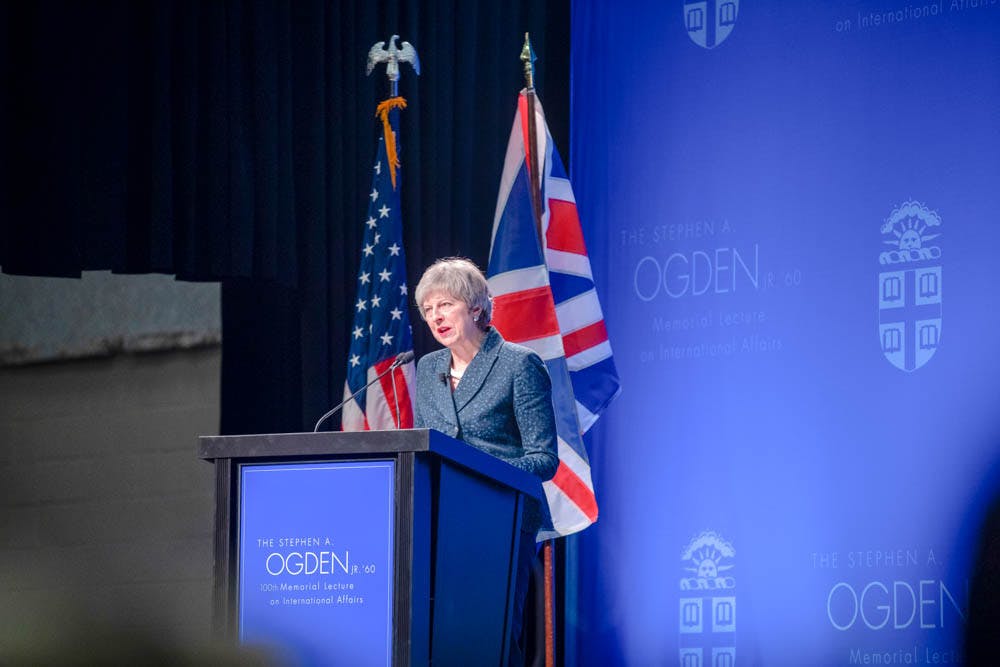Former Prime Minister of the United Kingdom Theresa May spoke about Western values, political polarization and global challenges during her visit to the University March 4.
The 100th Stephen A. Ogden Jr. ’60 Memorial Lecture, which was held in the packed Pizzitola Sports Center, consisted of a speech titled “Politics, Populism and Polarization: Perspectives on the Global Economy” followed by a question-and-answer session with President Christina Paxson P’19. Paxson drew questions from University students and professors, asking about a variety of topics ranging from Brexit to the American fascination with British cultural phenomena.
Early in her speech, May emphasized the special link shared by the United States and the United Kingdom. She pointed to a shared linguistic and legal heritage in English and the use of Common Law, and a set of values including a belief in reason, personal liberty, freedom of thought and speech and the constitutional government of nations.
May said these can also be described as “Western values, not because they are the exclusive property of North American and European liberal democracies, but because those values have so decisively shaped the politics and economies of Western countries over the centuries.”
She relayed the importance of the concept of “westlessness” at the recent Munich Security conference. Westlessness, according to May, is the idea that the world and Western countries may be becoming less Western.
“A world in which the Western alliance is a less effective force for good, less willing or able to stand up for the values we believe in, is a more dangerous world,” May said.
She also noted a polarized Western political sphere as another threat to future stability.
“The domestic politics of mature democracies are increasingly characterized by a polarization of opposing viewpoints and rancor,” May said. She pointed to exacerbating factors such as terrorism and toxic online discourse, which stem both from a “perverted Islamist ideology that is a travesty of the Muslim faith” and groups motivated by far-right extremism.
“Whereas patriotism, a love of one’s country, is a positive political force, nationalism is of its nature a narrow, aggressive and sometimes a racially charged creed. Globally, we observe a similar challenge,” May said. “In place of a united front among nations committed to shared values … a polarized politics has taken hold. It views the world through an absolutist prism of winners and losers which sees compromise and cooperation as signs of weakness, not shared strength.”
May detailed three factors contributing to challenges for global leadership to overcome in the near future. The first factor is a “fourth industrial revolution” that consists of nanotechnology, artificial intelligence and the Internet of things. The second factor is the repercussions of the global financial crisis of 2008 — namely, a loss of faith in political and economic institutions. Finally, leadership must overcome the burden imposed by climate change. May emphasized that all of these factors disproportionately affect less urban, “provincial” communities.
Although the talk was nominally focused on polarization, some community members thought May’s speech felt too broad, especially in comparison to the more directed question-and-answer session with Paxson.
“One thing Paxson did well was to make sure to get questions from all over the (undergraduate) population other than professors,” said Elaina Kim ’21, a student at the event.
Some students also felt ambivalent toward the term “westlessness.”
“It felt a little like East vs. West,” Kim said.
Eva Carpenter ’22, another attendee, added that “I feel like the intention definitely was not malicious … but she is from a conservative party from England.”
Ishaani Khatri ’21, who also attended the event, said “I have family members in the East but I’m a U.S. citizen. Am I Eastern or Western? I don’t think I’m either, and I feel like in that sense I don’t really love (the term westlessness). … Maybe the point she was making was fantastic but the wording was something I really got hung up on.”





